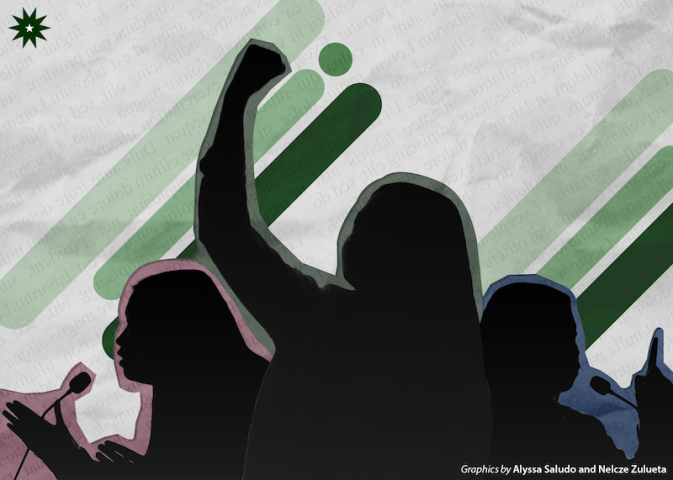The veteran. The pro-student. The upstart.
In the 11 years of University Student Government (USG) elections, DLSU has seen many student leaders walk through its hallowed halls, all distinct in their own respects. Notable among them are those who vie for the highest seat—USG President.
While each works hard to present personalities that stand out from the crowd, there are certain elements in a campaign that hits just the right spot for voters—suggesting that maybe they are not that different after all. Beneath the myriad of talking points and catchy slogans—and even color-coding choices—lies a pattern for electoral triumph.
This is the USG presidential playbook.

Rise through the ranks
To reach the highest elected position in student politics, one must first acquire some experience in a government office. Nearly all USG presidents since Migi Moreno in 2013 held elected positions prior to their ascendance, with a handful of them having been part of the Executive Board. Gabbie Perez, Pram Menghrajani, and Carlo Inocencio, for instance, were all vice presidents, while Zed Laqui was Executive Treasurer immediately preceding his presidential term.
“Generally, voters consider experience as a factor when selecting among candidates, especially when we are talking about top positions such as the presidency,” explains Lecturer Georgeline Jaca from the Political Science and Development Studies Department. More than that, she adds that political experience also creates an advantage in terms of popularity and publicity.
For those with limited experience, building their reputation may be particularly crucial. Mikee De Vega, for one, may have not held a USG post before her term, but she built her name in other ways: she won a world debating competition while she was La Salle Debate Society President in 2016, and in 2014, she contested the constitutional plebiscite before the Judiciary with other members of Alyansang Tapat sa Lasallista (Tapat), her erstwhile party before going independent.
The same goes for Lance Dela Cruz, who left the USG after his time as Legislative Assembly representative in 2017 but remained active in Tapat’s social engagements as its Vice President for External Affairs the year prior to his presidential bid.
Be one with the people
Student leaders often portray themselves as being no different from the people they aim to serve.
Moreno, who ran independent, achieved this during his room-to-room campaigns by explaining his platform through simple blackboard drawings, projecting himself as a candidate with a genuine desire for a “focused” presidency and the willingness to spend his own money just to attain it. This starkly contrasted his partisan opponents who had shelled out thousands just to fund their campaign and rely on political machinery provided by their well-established parties.
But partisan candidates can also take advantage of this approach. Perez, who ran under Santugon sa Tawag ng Panahon (Santugon), portrayed herself as an “imperfect leader” to voters during her campaign.
“I am real, I am honest, and I am human,” she told the crowd in her miting de avance (MDA) speech in 2018.
These kinds of remarks may have parallels to Southeast Asian politics expert Mark R. Thompson’s definition of Philippine populism, which says that populist candidates typically evoke the “I am like you” and “I am with you” narrative.
“For these kinds of candidates to get the support of the voters, they try to present themselves to be sympathetic towards the concerns, the struggles, the stories of their constituents,” Jaca expounds, noting that students can pursue populist strategies.
Arouse dissatisfaction
Aside from presenting themselves as one of the people, populist candidates also attempt to unite the public by identifying a common enemy, Jaca explains. “In the Philippine context, it is the rich versus poor dichotomy, and in the University setting, it could be students versus the [DLSU] admin.”
In the 2014 General Elections, Santugon candidates led by Inocencio argued during the annual debate that the USG’s effectiveness was hampered by University administrators. While Tapat eventually won that round of debate, it was Santugon who would go on to win seats in the election.
More recently, the University administration’s online learning policies amid the COVID-19 pandemic have become a major point of criticism. “The pandemic has left us scrambling to our feet, drafting petition after petition, for a more equitable learning setup,” Ragudo passionately told voters in the Make-up Elections 2021 MDA. “We must begin asking why the system has never been in our favor, and [it is] simply because it remains far from perfect.”
“Populists thrive off of a crisis—at a larger, say, country-level context—or some level of dissatisfaction,” Jaca points out. “They are able to deepen cleavages between the competing groups and reap benefits off of that. It is an effective strategy since the candidates are able to relate with their constituents and tug [at] their heartstrings.”
Other times, sentiments like these are directed toward student governance, criticizing the USG status quo or of campus politics in general. This was seen in a campaign video for De Vega, which featured students saying that “the current system did not represent us” and skewering the “old methods of the yellow and the red”—alluding to the colors of political parties Santugon and Tapat, respectively.
Almost the same messaging had been heard years prior from another independent candidate. Moreno, in his 2013 miting de avance speech, proclaimed, “The students don’t feel that the USG is there for them,” packaging himself as a “new brand of leadership.”
But while heartfelt speeches and well-crafted plans of action could position one as a better alternative to the status quo and boost their chances of winning the presidency, the candidates, once in office, must still prove that they can actually lead the student government.
“You can be the textbook candidate that people would easily fall in love with, but you can be a terrible leader,” Jaca says. “At the end of the day, students vote for leaders.”
